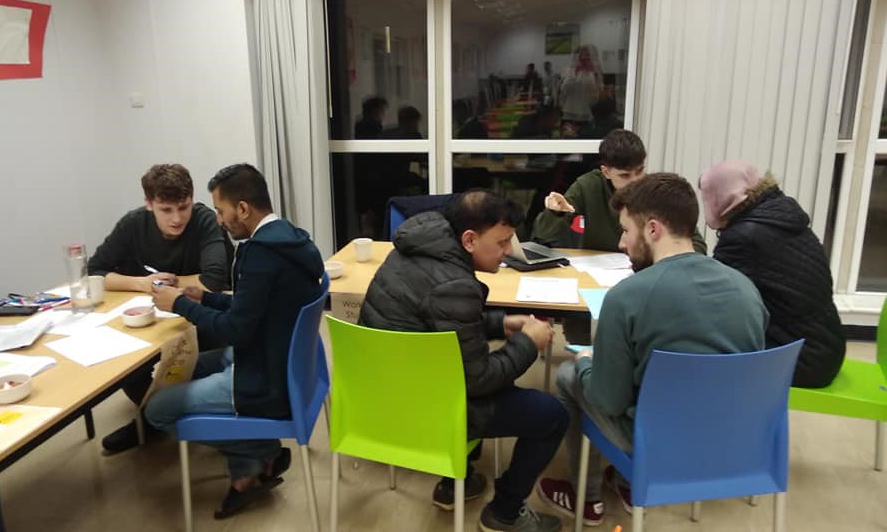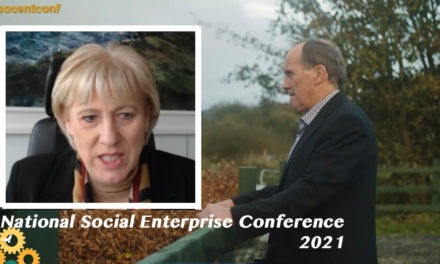When it comes to supporting asylum seekers, there’s a sense that governments can only do much. That leaves it up to communities and social enterprises to close the gap.
As the number of people from Africa and the Middle East seeking asylum and refugee status throughout Europe continues to grow, efforts must be made by communities and operators in their new host countries to ensure they are not ignored, excluded or left to languish without any supports.
These efforts can be as wide-reaching as increasing asylum seekers’ weekly allowance or as (seemingly) small as offering education and employment coaching in a bid to improve employability.
Ceangal, a student-run social enterprise that’s part of the Enactus 2018-2019 cohort, has opted for the latter. Here, Sean Lynch speaks to Kirsty Tobin – in an interview conducted in collaboration with Enactus – to tell her more about the project he, Clodagh Hayes, Greta O’Neill and Elvis Seporaitis run from University College Cork (UCC).
Can you tell us about your project?
Ceangal aims to help asylum seekers obtain employment in Ireland. We do this by providing residents in direct provision centres with the skills necessary for work. Last year, we ran an employment workshop in the dining hall of Kinsale Road Accommodation Centre, Cork. The workshop consisted of two stands. The first provided information in relation to CV advice and interview skills, and the other informed the residents on their rights to work and about scholarship opportunities available to them in Cork.
For the upcoming year, we will collaborate with local corporations to provide more professional, skills-oriented workshops to people living in direct provision. From a corporate social responsibility and value-added perspective this will be hugely beneficial to the firms. The value of diversity in the workforce is becoming abundantly clear. Look no further than the wave of corporate support for the LGBTQ community. The opportunities to engage with these companies and the skills obtained will be fantastic for asylum seekers in centres such as that at Kinsale Road.
What social need does your project address?
It addresses the need for quality education and reduces the inequalities that asylum seekers face in Ireland.
Work is an effective way of integrating into a community. However, employers are unsure of the value asylum seekers can offer to their firms, and a proportion of the Irish population are unsure of how to welcome them. Consequently, asylum seekers experience great difficulty in finding employment and, thus, assimilating into Irish society.
The employment workshops will equip them with the experience and skills to present in any interview and successfully gain employment here in Ireland.
What first stirred your interest in this area?
The topic of direct provision is unavoidable. It is all over the media. So, naturally, the topic of asylum seekers in Ireland sprang to mind when examining pressing social needs.
As well as that, I spent my third year of college in Strasbourg, France. This gave me insight into the experience of having to assimilate in another country with a different culture, education system and language.
It wasn’t always easy and the language posed a particular barrier to integration with the locals. This aspect of emigration, however small, was something I could relate to. As a team, we agreed that employment is essential for asylum seekers to learn the language and form relationships with local residents, allowing them to build a life here.
What prompted you or inspired you to get involved with Enactus?
Entrepreneurship has always been an area that fascinated me. Starting your own business is undeniably a difficult path but, ultimately, it’s the most fruitful. It involves creativity, bravery and initiative.
Social entrepreneurship, however, wasn’t something I had even thought about until I came across an advertisement for an Enactus UCC event on Facebook. I attended the event and immediately felt that this was something I’d love to be involved in. Not only were students starting revenue-generating enterprises, but they were starting ones that improved people’s lives.
What have you learned about social enterprise and community-focused entrepreneurship since starting this project?
I know this sounds clichéd, but one thing I’ve learned is that the most important aspect of any social enterprise is the people. More specifically, the people it helps.
Enactus requires that its students conduct needs assessments before piloting any project, but for us, it felt as if needs assessments were being carried out every week even after launch!
Our idea of what asylum seekers need can be very different from what they actually need. Moreover, the needs of people change all the time. “Give a man a fish and you feed him for a day. Teach a man to fish and you feed him for a lifetime…” So goes the old adage. But what if he doesn’t like fish?
Why do you think social enterprise matters?
Social enterprise is vital in solving social problems in the world today. Charities and non-profits undoubtedly perform fantastic work and possess some of the brightest and most selfless individuals in society, but social entrepreneurship engages a different type of personality. It allows for those who possess the hunger to innovate and create a sustainable business model to channel these skills in order to build a better world for everyone.
Mark Zuckerberg, Jeff Bezos, and Alice Walton have established the most successful businesses in the world through hard work, incredible innovation and remarkable leadership. Through their inventions, the world is now a more interconnected place, but have they actually made the world a better place? That is very much up for debate, especially when you consider the effects of globalisation on developing countries.
Do you think you’ll work to develop social enterprises after graduation, or even continue to grow your Enactus project?
100%. I have just graduated from UCC and will be starting work this summer, but social entrepreneurship is something which will stay with me after I leave.
As I mentioned above, the idea of generating an idea and building a business appeals to me greatly. My experience with Enactus has given me the bug for social entrepreneurship and I will continue to brainstorm and jot down any ideas I think of, as I have done this year. I strongly feel that there is greater support for social enterprises in Ireland today, which means it will become easier to act upon these ideas.
As for Ceangal, it will remain in the steady hands of students and staff at Enactus UCC. The funding opportunities and guidance available to projects, especially ones in their infancy, through the Enactus framework is really incredible. I am excited to see where students take the project next!
What advice would you give to students considering developing an Enactus project in the future?
Building a team with the right people is key. By this, I mean people who are involved in the project for the right reasons and who are eager to add value to it. It is then important to delegate the project work across different roles. This way, nobody is burdened with all the responsibility.
Avail of resources available to you. There is no better time to start a business than as a student. Talk to lecturers, talk to local organisations and regularly meet with your faculty advisors. For example, an outsider coming into UCC asking for legal counsel on the rights of asylum seekers would be charged consultancy fees. A student can avail of this for free. Make use of this resource.
Turn up. This goes for anything in life, whether academics, work or sport. You can only improve if you turn up every day. Attend as many Enactus events as you can, go to your Enactus meetings every week, and speak to as many people as possible about your project. The more time you put into your project, and the more advice you get on it, the better it will be.
Interested in reading more about the state of Ireland’s community development sector? Check out our latest issue.






